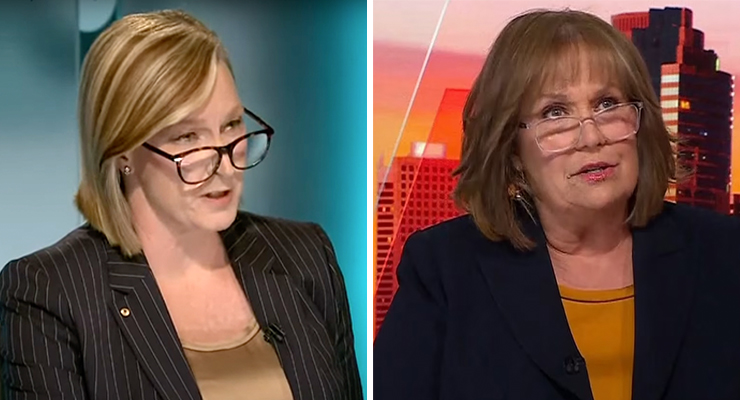
The last week of Scott Morrison’s campaign has been marked by two significant television interviews, one on the ABC on Monday night’s 7.30 by Leigh Sales, and the other the following night by Tracy Grimshaw on Nine’s A Current Affair.
The 7.30 outing had the greater pre-event hype, partly due to Morrison having held out for weeks from fronting the national broadcaster. But it was the Grimshaw interview that has had many talking since. It’s interesting to look at why.
Sales opened in familiar combative style: “How do you campaign effectively when even you are admitting that the biggest drag on the government’s reelection chance is yourself?”
Morrison’s response, alas, didn’t leave one feeling too optimistic about what was to follow. He batted the question away: “Because we have a plan …” This was followed by a good two minutes of blather about the plan.
For the rest of the interview, Sales probed and prickled the prime minister on a range of issues he’s vulnerable on: sports rorts; government debt; the likely inflationary effects of the superannuation policy; skill shortages; stagnant wages; lack of a credible climate policy; foreign policy failure; the threat of independents.
Morrison drew from his armoury of techniques to respond. There was the refusal to answer the question, on whatever basis he chose to advance:
Sales: You’ve spoken about things that you would do differently. What would you have done differently, for example, when it came to the way your government used community sports grants as a slush fund to channel money to marginal seats?
Morrison: Well, I completely reject that, Leigh.
Sales returned to the question. And on it went.
This type of interview is very much standard fare nowadays, where tedious quibbling about the norms of interaction often overwhelms any useful discussion about the issues. The problem is partly in the interview method. The approach is somewhat scattergun, relying on questions around a range of issues — a series of separate assaults, with the hope that one will deliver a killer blow. But this rarely happens. Heat is generated, but little light.
In all this the viewer is invariably the loser.
It is interesting that many of her questions covered similar territory to Sales’. These were framed, however, in a very different way — not as a discrete and fairly predictable assortment of prongs, but as part of a larger sequence, one designed to maintain control of the interaction and to keep the agenda squarely in the interviewer’s hands. The success of the approach was clear. By interview’s end, Morrison was rattled and angry.
Grimshaw’s first question only hinted at the narrative to follow: “How long have you known that you are a bulldozer?”
Morrison, in his new confessional mode, explained that he’s known for some time but that it’s been necessary for all the tough things he’s had to do.
Echoing one of Sales’ early questions, Grimshaw next asked: “What would you have done differently in the last three years, if you’d known that so many Australians were holding a grudge?”
Morrison admitted he could have been “more sensitive at times” and then reverted to just about his only mea culpa in recent days: the purported failure to “militarise” the vaccine rollout sooner.
Not much there about grudges, sensitivities, etc. Then there was a predictable pivot and boast — how under his leadership Australia ended up with arguably the highest vaccination rates in the world.
This was allowed to pass. Grimshaw was on a tight script. The “what would you have done differently” line was the theme she was pursuing.
“Let me toss a few random examples at you,” she said. “Would you have not referred to the life-risking, life-saving heroism of rural firefighters as ‘holding a hose’ if you had your time again?” At once, a question and a brutal condemnation.
This was greeted with a rare silence. The PM blinking — and then meekly: “That wasn’t exactly the context of the comment, but no, that comment wasn’t helpful at the time.” And then from the normally hyper-voluble PM, no more words.
Grimshaw had two other random examples to toss in. Each is worth quoting in full:
Would you have made more of an effort to acknowledge and meet the women who marched in Canberra and around the country because they’ve had enough of bullying and marginalisation? Would you like your time over again, and what would you do differently?
And:
Would you have handled the cancellation of the French subs a bit better? Did Emmanuel Macron cop the bulldozer treatment?
Morrison was showing rare nerves. This was dangerous territory. It was not in his nature to take backward steps like this. The eyelids were flickering at double speed now.
He weakly defended his no-show at the women’s march — I offered to meet them inside; I had other appointments, etc. The Macron question saw him more fired up. In this was an opportunity to go on the front foot and to fire up the national security pitch. (“That is the first time that any other country apart from the UK has been able to access nuclear submarine technology from the US.”) The artless braggard showed no awareness of the trap that had been set.
Grimshaw’s next questions were where the interview was always headed.
There was the bulldozer claim:
Well, President Biden said he thought it [the Macron affair] should have been done with more grace. I mean, I’m trying to figure out where you’ve been a bulldozer, because you’ve said you’ve been a bulldozer. I’ve given you three examples and you said you weren’t.”
And then, the “I’m going to change” claim:
If you win this election, where are you actually going to change? I mean, you’ve said that you’re going to change when you just basically said that everything you’ve done’s been OK?
Morrison just talked away, finger-pointing at times. But the damage was done. The charade was exposed — not only in the logic of the discussion, but also in the blustering way that many of his responses were delivered.
This was a keen intelligence at work, all stemming from a carefully compiled sequence of questions. In rhetorical terms, it was a finely executed argument by induction — the PM had been claiming he will change, but here was systematic evidence to compel the opposite conclusion: he won’t and he can’t. Not only was this serious pressure being exerted on a politician who is used to getting away with so much, it was also riveting television. It is the type of smart political interviewing the country desperately needs.
Grimshaw was not done. After a scrappy exchange about superannuation, the interview concluded with a final question, one that recapitulated the earlier theme:
Prime minister, you said at your launch on Saturday that, ‘I saved the country.’ But you don’t hold a hose, you weren’t in your tinnie plucking people off rooftops, you weren’t doing 16-hour days in PPE on COVID wards, you didn’t get enough vaccines soon enough, you didn’t get enough RATs so that we could finally have a holiday interstate for Christmas, and China is set up, based in the Solomons.
And then using her thumb and index finger to indicate something very small: “Do you think maybe you over-egged the part ‘I saved the country?’”
Morrison tried to mop up, quickly reverting from “I” to “we, the government”, but getting more and more shrill as he sought to justify his claim.
This was truly a killer blow, and the “egging” of Morrison appeared as a headline in the press the next day.








Geez just think about how much material the msm has had to work with on the this bloke and his crew and the fact they’ve mostly chosen not to.
Could have absolutely destroyed this government years ago just on their factual record.
They could’ve destroyed Abbott in a week but instead spent 4 years propping him up.
Great comment Bob!
Krudd could have done it has he called an climate change election as soon as the Abbottrocity became leader in December 2019.
Was it that weak kneed non-response which finally impelled Gillard to throw in her lot with her career long enemy, the Machine Right and knife him?
And if that same MSM had held ‘those powerful’ to account (rather than indulge, chuckle away with them and marvel in their “clever politics”) we as a country could have been in a better place than we are now.
This is precisely why Leigh Sales has been allowed to host 7.30 for so long.
She doesn’t dig deeper than one question deep.
Her method encourages spin, which makes the ABC exactly what the coalition want it to be – a non-threat that holds no minister to account, and doesn’t facilitate analytical thought about public policy.
Sales has always done this. She has her list of questions and she’s determined to get them all out. If that means not following up, or asking the obvious killer blow well, so be it.
Watch her. She nearly gets there and then looks down at her running sheet and says “Moving on.”
It would be Albanese’s luck to win and then have to face Sarah Ferguson for three years, a trial Morrison may well avoid.
That will be our good luck if Sarah Ferguson does a good job.
She’s always done a good job Frank..
Sales has always made it a contest. Bad manners towards her “guest” Sarah Ferguson cannot replace her quickly enoug.
Unfortunately I remember Ferguson’s sycophantic interview of Steve Bannon. He’s a con man and she was conned.
Well done to Tracy Grimshaw, but unfortunately, other people on Nine’s payroll have been working feverishly to undo the damage.
Well done Tracy, at last a clear indicator of Smirky.
Great article, Tim. I’m deliberately avoiding the interviews because I find them frustrating but your summary was both informative and educational.
Many thanks.